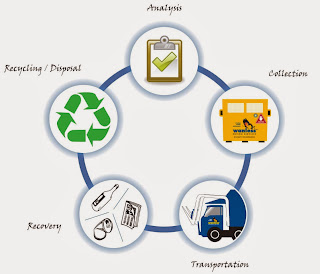I wrote this paper March 14, 2002 during college and it will never be a dying subject.
Waste. Is
it a waste of time? How many of us
recycle? I mean actually recycle. How many of us care? I mean care about the future. Does recycling really work? Do the landfills really recycle? These are just a few questions that
come to mind when I think of garbage, refuse, trash, debris or any other word
that means waste. We live day to
day without a notion about where or how waste is disposed of. Should we have to worry about
recycling? It’s not our duty to
make sure the landfills are doing their jobs, or is it? If we stopped for one instant and
thought about it, we’d realize that it is our job, because we all live on this
planet together and created the waste to begin with.
“Americans generate more waste
every year, growing from 247 million tons of non-hazardous waste in 1990 to 490
million tons in 2001”, according to Biocycle magazine, an industry
publication. According to the
website,” Americans generate trash at an astonishing rate of four pounds per
day per person, which translates to 600,000 tons per day or 210 million tons
per year!” (www.howstuffworks.com). They continue
to say that this is almost twice as much trash per person than in most other
major countries. The majority of this trash is buried in landfills.
What is a landfill? It is a carefully designed structure
built into or on top of the ground in which trash is isolated from the
surrounding environment such as groundwater, air, or rain. This isolation is accomplished with a
bottom liner and a daily covering of soil. There are two types of landfills: sanitary and municipal
solid waste landfill. The sanitary
landfill uses a clay liner to isolate the trash environment and the municipal
solid waste landfill uses a synthetic or plastic liner to isolate the trash environment. A landfill does not decompose garbage
quickly. When a landfill closes,
it must be watched and evaluated for 30 years after the closing.
We need to recycle. By recycling, we will reduce the amount
of trash that needs to be buried. In 1991, the U.S. population was 249,439,545
and (mostly) municipal waste, which was generated in tons, was 293,613,000,
with 11.5% if it recycled. In
2001, the population was 286,345,000 with 409,029,000 tons of mostly municipal
waste and 32% was recycled. According
to the website, “Although 32% of municipal waste is reported as recycled, there
are two problems with this; one, is the EPA estimated in 1998 at municipal
waste was only two percent of all waste generated. Secondly, the total amount waste generated, recycled, or
disposed is not fully known because the EPA has not collected work to confirm that
data“ (www.zerowasteamerica.org).
Waste disposal statistics do not
take into account waste that is disposed (burned or landfilled) on-site or
off-site and illegitimate dumps and incinerators, which include burning
barrels. The statistics also do
not include waste that is recycled and in an environmentally destructive
matter, such as the so-called, "beneficial use" recyclable.
So let's say you do recycle, do you really think the
workers who pick up your trash put it and a separate section? They must, because if these workers who
pick up your trash, were following recycling regulations, the percentage of
recycled waste would not have nearly tripled. Imagine what the world would be like 20 years from now, if
we didn't recycle. It's the three
R’s, recycle, reduce, and reuse.
There's are numerous ways that we can cut down on
waste. Instead of buying plastic
cups, forks, knives, spoons, and other disposable products, we should reuse the
glasses, or silverware that we already have in your home. Personally, I think recycling should
start with manufacturers. Some of
these companies make it too easy for us to toss these products in the trash
can, rather than a recycling bin.
Another example of unnecessary waste is the computer; how many of us own
home computers? What do we do with
them when they become obsolete?
First off, sure, we try to resell, but when that fails, where do they
go? In the garage, basement or
storage unit is usually where they end up. We should make the big companies take them back and let them
recycle the products they manufactured.
Years ago, McDonald's used to use Styrofoam
containers, now they use paper. I
don't think that McDonald's decided on their own that they needed to use paper
for better recycling purposes. I think environmentalists pressured them. Maybe they saved money at the same
time, and maybe not. The one thing
that I am sure of is that we all need to recycle. Recycling will not only help the environment; it will also
reduce the amount of trash in the landfills. With more and more landfills closing, by the time our
children, or children’s children grow up, there will be virtually nowhere for
the trash to go.
I can remember when I was a child, my mom used to tell
me stories. One story was about a
dump close to where I live. Many
people refer to a landfill as a dump.
They are not the same. A
dump is an open hole in the ground where trash is buried and has various
animals like rats, mice and birds swarming around it. My mom used to go shooting with all of
her friends at this dump when she was young. They would shoot the rats, and mice just for fun. The dump is no longer there, but in
reality, it is, it is only covered over by dirt and plants. To this day there
still is a “for sale” sign posted on the property. It makes me wonder if the person who buys the land will be
told about the dump that originally existed there. Is the reason that the sign is still there because people
know there is a dump underneath? Is
it that they don’t like the land? The
point is that we don’t know where all of the old dumps are and unless we ask,
we will never know.
If we knew years ago how much recycling helped us,
most old dumps would not be closed or hazardous today. How do we know if the water we
drink is contaminated by waste from old dumps? We don’t. For that matter, how do we know if the development
we live in or by wasn’t constructed over top of an old dump? Did you ever ask? The only way questions like this can be
answered, is if we ask. Knowing is
just the beginning, but educating people around us will make them understand
that recycling isn’t a waste of time. Just remember recycling today will make tomorrow a better,
cleaner, and waste-less place. Live, laugh, and love.





No comments:
Post a Comment